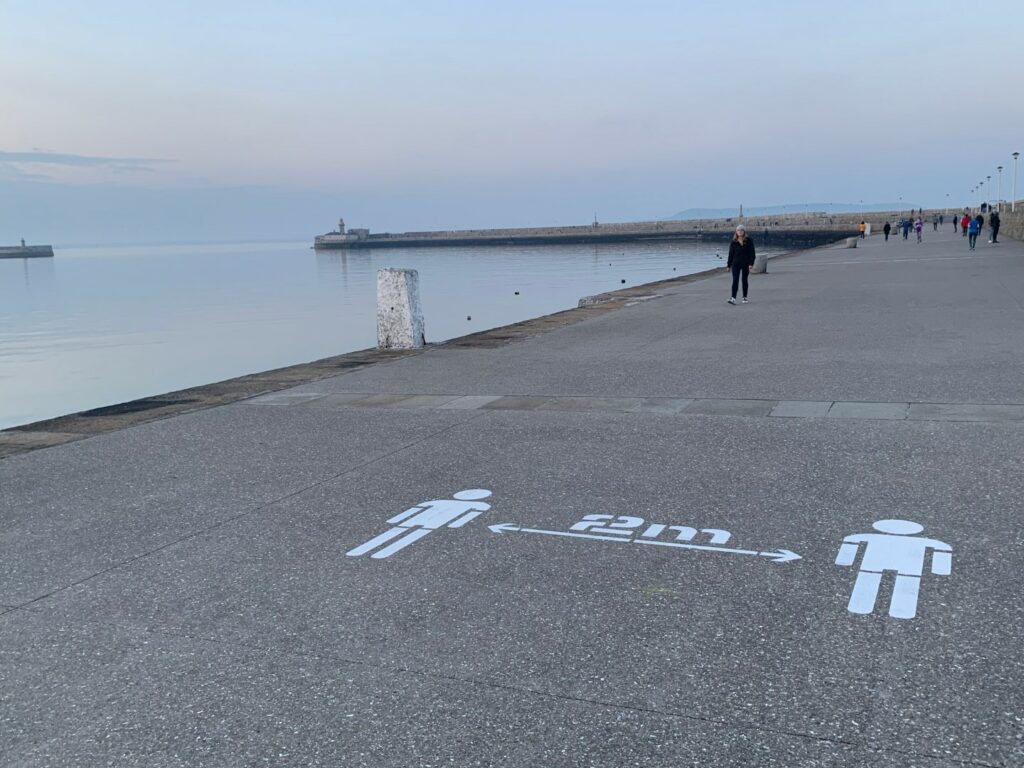Tradition, leadership, and religious rights in Ireland during the pandemic
Tradition, leadership, and religious rights in Ireland during the pandemic
The pandemic has greatly affected religious life in Ireland. The country now needs to consider the role of the Church in the future.
This article is part of our series on the social impact of COVID-19.
Like the majority of European countries, Ireland has been significantly impacted by the COVID-19 pandemic. At the beginning of March 2022, two years on from the first confirmed case of COVID-19 in the country, Ireland had had 1.3 million cases of coronavirus and 6,570 deaths.[1] Statistically, these figures are significantly lower in comparison to some other European countries, such as the neighbouring United Kingdom (UK). Yet, when it comes to the social implications of COVID-19, the impact has been just as great in Ireland as elsewhere.
In particular, the coronavirus pandemic has affected religious life in Ireland. While Ireland’s relationship with religion is in flux, it still remains a religious country by European standards. Upholding religious traditions is of specific importance,[2] something that was curtailed for much of the past two years. This chapter will assess the different ways in which COVID-19 impacted religious practice within Ireland and how religious communities and leaders responded to such challenges.
Rituals interrupted
Even though religious affiliation is decreasing in the country, the Catholic Church still maintains a central presence in society.[3] Because of this, this chapter will focus on the impact of COVID-19 on the Catholic Church in Ireland.
Traditions are of great importance in Ireland and, in particular, are intrinsic to Catholicism. Bearing in mind that “Catholicism acts as a cultural identity as well as a religious identity,” many Irish people, including those who do not regularly attend church, still observe traditional “Catholic life-cycle rituals.”[4]
However, with the arrival of the pandemic, these traditions were put on hold indefinitely. On the 17th March 2020, then Taoiseach[5] Leo Varadkar announced a national stay-at-home order and non-essential social activities were restricted. Funerals were permitted but only a handful of close relatives were allowed to attend.[6] For Irish Catholics, wakes and funerals typically involve entire communities but the restrictions meant that these “end-of-life rituals” were not possible.[7]
Moreover, beginning-of-life rituals, such as baptisms and confirmations, were also curtailed for over a year. Whilst life cycle ceremonies with 30 attendees were allowed to take place in the UK from May 2021, in July 2021, such ceremonies were deferred in Ireland due to the Delta variant.[8]
The Catholic primate Archbishop Eamon Martin explained that there was “a lot of frustration and deep disappointment” in response to this decision.[9] Considering that the majority of churches were following all safety precautions, many church leaders felt the government decision was not necessary and highlighted the Taoiseach’s lack of consideration for religious ceremonies.[10]
Religious vs political authority
Such tensions over government coronavirus rules and public expressions of religion between religious and political leaders were not uncommon in Ireland. For example, in April 2021, Archbishop Eamon Martin expressed “deep concerns” over new restrictions that made the majority of religious gatherings illegal.[11] He said that people of faith in Ireland considered “respecting and sustaining people’s spiritual well-being” as vital and equal with concerns for physical and mental health.[12] Moreover, he argued that the “vital pastoral work” of religious ministers should also have been deemed essential.[13]
Furthermore, after life cycle ceremonies were deferred again in July 2021, Archbishop of Dublin, Dermont Farrell, told priests in his diocese to defy the government ban which he said was “discriminatory.”[14] The archbishop said it was perplexing that celebrations of the sacrament were restricted, yet “no such prohibitions are applied to other events, such as sporting or civic events.”[15]
The Taoiseach Micheál Martin said he did not approve of any “unilateral breaching” of COVID-19 regulations and wanted to know if it was “too much to ask” that the regulations were adhered to.[16] Clearly, the pandemic highlighted the feelings of some church leaders that religious expression was not being given appropriate freedoms.
COVID-19 and crisis over leadership
Beyond restricting religious traditions and creating tensions between religious and political authority, COVID-19 has exacerbated already existing worries within the Church in Ireland. In particular, for many years, there have been grave concerns over the ageing population of Irish priests. Due to the lack of young people choosing to train to be religious leaders,[17] most priests in Ireland work until they are 75 years old with some continuing working into their 80s and 90s.[18] Fr Hazelwood from the Association of Catholic Priests (ACP) believes that bishops are “playing on the generosity” of priests by placing extra demands on them.[19] Fr Hoban from the ACP explains that, subsequently, there are “high levels of depression” and isolation amongst the clergy.[20]
This already existing concern was exacerbated by the arrival of the COVID-19 pandemic. Due to the fact that older people are more at risk of becoming seriously ill from COVID-19,[21] it is not surprising that older members of the clergy have been affected by the pandemic. For example, the Spiritans, a Catholic group with five parishes in Ireland, lost 18 priests to the virus in one year.[22]
Moreover, whilst the shift from in-person to online services necessitated by the pandemic has been popular amongst many congregants,[23] it has been challenging for some older priests. Fr Hazelwood said that some priests are becoming increasingly anxious when performing online masses because of the pressure to be performers and the bad reviews from “mass-hopping” worshippers.[24]
Therefore, the pandemic shone a light on pre-existing concerns around the ageing population of Irish priests. Archbishop Farrell states that if the “vanishing” of Christian faith continues in Ireland, the problem of ageing priests and the future of leadership within the Church will not improve.[25]
Religious life post-pandemic
Like most European countries, as Ireland begins to emerge from the pandemic, religious leaders and believers are assessing what has been learnt over the past two years and what the future holds for religious life post pandemic. Although some congregants have been delighted to return to in-person services,[26] it is too early to tell how many will eventually return.[27] If attendance does not pick up, Irish author Salvador Ryan suggests that the pandemic could mark “the final rupture in the history of Irish Catholicism.”[28]
What is clear is that the practice of religious traditions, the relationship between religious and political leaders, and the leadership of the Church have been fundamentally altered by the COVID-19 pandemic. As Archbishop Martin said, the pandemic “lifted the veil” on the position of the Church in Ireland[29] and has forced the country to consider its role in the future.
Want to learn more about similar topics? Go to the EARS Dashboard and receive weekly updates.
Sources
[1] Novel Coronavirus (COVID-19) Cases, provided by JHU CSSE
[3] Religion – Religious Change – CSO – Central Statistics Office
[5] The Taoiseach is the head of government in Ireland.
[6] gov.ie – Briefing on the government’s response to COVID-19 – Tuesday 31 March 2020
[7] A Good Death Is a Rite of Irish Life. Amid Coronavirus, That Looks Different. – The New York Times
[8] Baptisms, First Communions, Confirmations deferred due to Delta variant
[9] Baptisms, First Communions, Confirmations deferred due to Delta variant
[10] Baptisms, First Communions, Confirmations deferred due to Delta variant
[11] Archbishop Eamon Martin expresses concerns at criminalisation of public worship in Ireland
[12] Archbishop Eamon Martin expresses concerns at criminalisation of public worship in Ireland
[13] Archbishop Eamon Martin expresses concerns at criminalisation of public worship in Ireland
[14] Archbishop of Dublin gives green light to Communions and Confirmations saying current ban seen by many as ‘discriminatory’ – Independent.ie
[15] Archbishop of Dublin gives green light to Communions and Confirmations saying current ban seen by many as ‘discriminatory’ – Independent.ie
[16] Taoiseach ‘does not approve’ of Communion, Confirmation ban breaches
[17] The ‘imported’ priests saving Ireland’s ageing clergy – BBC Worklife
[18] Generosity of priests ‘being played on’ as most work long past retirement age – Independent.ie
[19] Generosity of priests ‘being played on’ as most work long past retirement age – Independent.ie
[20] Aging priests in Ireland said to increasingly face depression, isolation | National Catholic Reporter
[21] WHO delivers advice and support for older people during COVID-19
[22] Religious order feared ‘we would all be wiped out’ by Covid-19
[23] In the first two weeks of the pandemic, the daily masses attracted an average weekday audience in the upper 30,000s, comparable to a usual Sunday mass on RTÉ One. Is Ireland turning to religion during the Covid-19 crisis?
[24] Priests tell of suffering from increased anxiety due to online mass reviews during lockdown – Irish Mirror Online
[25] Christian belief ‘vanished’ in Ireland, Archbishop warns – The Irish News
[26] ‘It’s just wonderful’ – Catholic churches in NI start to welcome back parishioners
[27] Might Covid and 2020 mark a final rupture in history of Irish Catholicism?
[28] Might Covid and 2020 mark a final rupture in history of Irish Catholicism?






